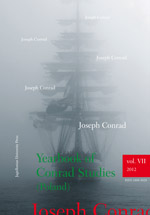Conrad´s Marseilles
Conrad´s Marseilles
Author(s): Franciszek ZiejkaSubject(s): Literary Texts
Published by: Wydawnictwo Uniwersytetu Jagiellońskiego
Keywords: Alfonso XII; Carlists; Don Carlos; La table de Cracovie; Marseilles; The Arrow of Gold; The Mirror of the Sea; the theatrical life of Marseilles; Tremolino
Summary/Abstract: This article discusses the Marseilles period of Conrad’s life, which is still shrouded in mystery. By consulting the Marseilles municipal archives and examining information culled from the local press for the years 1874–1878, the author attempts to determine what events in the life of Marseilles during that particular period may have found an echo in Conrad’s works, and in what way these events could have influenced the personality of the young writer. The author sketches a vivid picture of everyday life in the Marseilles of the 1870s and recalls the principal events in the city’s artistic life, suggesting that Conrad’s first real experience of the opera and the theatre (and no doubt also of the fine arts) was gained in Marseilles. An analysis of all the available documents makes it possible to formulate the following conclusions: 1) The duel between M. George and Blunt, as described in The Arrow of Gold, had its origins in real life: this was the duel between two journalists — C. Hugues and J. Daime — which was then the talk of the town. 2) In drawing the character of Rita de Lastaola in The Arrow of Gold, Conrad most probably made use of several complementary models from real life: apart from Paula de Samoggy (mentioned by J. Allen), the model for Rita may well have been Mme Didier — the mistress of the wellknown Marseilles painter G. Ricard, who himself was quite probably the real-life model for the character of Henry Allègre. 3) During the time when Conrad was in Marseilles the political situation in Spain had completely stabilized and it is hardly likely that Conrad himself could have taken part in any gun-running for the Spanish Carlists. Monsieur George’s escapade may therefore be treated purely and simply as a reminiscence of the stories told by Provençal sailors who had earlier taken part in the smuggling expeditions of 1874–1875. The final section of the article draws attention to possible Marseilles sources for Falk, Heart of Darkness and An Outpost of Progress. Virtually the entire storyline of Falk may be found in the Marseilles press, while the two African stories can be seen as a hypothetical refutation of the tales told by the “colonizer of the Congo” Henry Stanley, who in January 1878 was given a hero’s welcome in Marseilles.
Journal: Yearbook of Conrad Studies (Poland)
- Issue Year: 2012
- Issue No: VII
- Page Range: 51-67
- Page Count: 17
- Language: English

